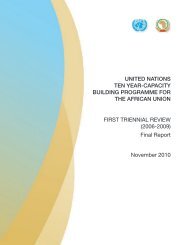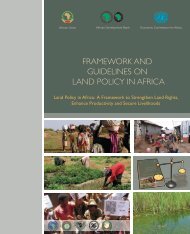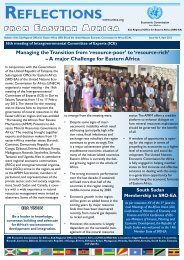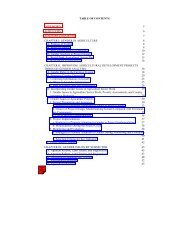A Decade of NEPAD - Economic Commission for Africa - uneca
A Decade of NEPAD - Economic Commission for Africa - uneca
A Decade of NEPAD - Economic Commission for Africa - uneca
Create successful ePaper yourself
Turn your PDF publications into a flip-book with our unique Google optimized e-Paper software.
• Promote partnerships on <strong>NEPAD</strong> development projects<br />
in <strong>Africa</strong>,<br />
• Influence public sector policies,<br />
• Stimulate trade synergies,<br />
• Encourage an environment conducive to business,<br />
• Contribute to the development <strong>of</strong> the <strong>NEPAD</strong> APRM<br />
Programme <strong>of</strong> Action<br />
• Represent the interests and views <strong>of</strong> the private sector,<br />
and<br />
• Develop best practice standards <strong>of</strong> corporate<br />
governance<br />
In 2008, the NBF established a Project Management Office<br />
with the aim <strong>of</strong> disseminating in<strong>for</strong>mation and knowledge<br />
about <strong>NEPAD</strong> projects and to facilitate and coordinate<br />
projects, partners and programmes across sectors. NBF<br />
is also working with other organized business entities<br />
within the SADC region and with the SADC Secretariat<br />
to establish a <strong>NEPAD</strong> SADC Business Hub that will:<br />
ӹ Ensure the private sector’s role in the development <strong>of</strong><br />
economic growth on the continent,<br />
ӹ Address the current challenges that exist in conducting<br />
business within the SADC region,<br />
ӹ Promote trade and investment flows,<br />
ӹ Rein<strong>for</strong>ce the role <strong>of</strong> the private sector as a contributor<br />
in the development <strong>of</strong> regional trade and economic<br />
policies, and<br />
ӹ Strengthen integration within SADC.<br />
Notwithstanding these encouraging examples <strong>of</strong> private<br />
sector intervention and engagement with the <strong>NEPAD</strong><br />
programme, the body <strong>of</strong> research to date on the subject<br />
suggests that much more can and will need to be done to<br />
establish a meaningful partnership between <strong>NEPAD</strong> and<br />
<strong>Africa</strong>’s private sector and to foster a feeling <strong>of</strong> ownership<br />
in the <strong>NEPAD</strong> initiative among the <strong>Africa</strong>n enterprise<br />
collective.<br />
In the area <strong>of</strong> SME capacity building and the development<br />
<strong>of</strong> programmes that provide in<strong>for</strong>mal private sector<br />
support, much less has been undertaken within <strong>NEPAD</strong><br />
with the exception <strong>of</strong> the work that is being planned to<br />
engage small scale farmers within the Comprehensive<br />
<strong>Africa</strong>n Agriculture Development Programme and the<br />
initiatives funded under the <strong>NEPAD</strong> Spanish Fund <strong>for</strong><br />
Women Entrepreneurship.<br />
4. <strong>NEPAD</strong> and the <strong>Africa</strong>n Private Sector Today A <strong>Decade</strong> <strong>of</strong> <strong>NEPAD</strong><br />
Selected key constraints that have been identified as impediments<br />
to more effective private sector involvement<br />
with <strong>NEPAD</strong> were identified during ad hoc expert group<br />
discussions and related research supported by OSSA and<br />
the UNECA. Specifically, it was expressed that there was<br />
a need to address the following:<br />
ӹ Involve small and medium sized firms in the <strong>NEPAD</strong><br />
implementation process;<br />
ӹ Improve the capacity <strong>of</strong> the regional economic communities,<br />
particularly in regards to helping them establish<br />
structures to engage more effectively with the private<br />
sector, to design and manage PPPs, and to implement<br />
projects;<br />
ӹ Move from adhoc engagements between the private<br />
sector and <strong>NEPAD</strong> to a more clearly defined relationship<br />
with key stakeholders (also including the <strong>Africa</strong>n<br />
civil society) and create a coordination mechanism <strong>for</strong><br />
PPPs in <strong>Africa</strong>;<br />
ӹ Develop mechanisms to facilitate access to venture<br />
capital and guarantees;<br />
ӹ Provide risk guarantees <strong>for</strong> domestic <strong>Africa</strong>n investors<br />
and <strong>for</strong>eign investors in infrastructure and accelerate<br />
the harmonization <strong>of</strong> differing legal and regulatory<br />
frameworks.<br />
Other constraints that were identified that impeded private<br />
sector engagement with <strong>NEPAD</strong> by the <strong>Africa</strong>n private<br />
sector include 69 :<br />
ӹ The Limited Integration <strong>of</strong> <strong>NEPAD</strong> into National Development<br />
Priorities – Just as the AU and UNECA found<br />
that regional integration matters were <strong>of</strong>ten given less<br />
priority by AU member states in terms <strong>of</strong> their support<br />
<strong>for</strong> the RECs 70 , the absence <strong>of</strong> consistent prioritization<br />
<strong>of</strong> <strong>NEPAD</strong> within national development priorities<br />
meant that stakeholders such as the private sector and<br />
civil society were also lead to believe that <strong>NEPAD</strong> and<br />
regional integration, generally, was not a high priority<br />
at the national level;<br />
ӹ Poorly Funded and Inadequate <strong>NEPAD</strong> Supporting Infrastructure<br />
within <strong>Africa</strong>n Governments – In addition<br />
to inadequate priority being given to <strong>NEPAD</strong>, the fact<br />
that governments were accordingly not establishing<br />
clear and accessible mechanisms through which to<br />
69 The Role <strong>of</strong> the Private Sector and Civil Society: Review <strong>of</strong> <strong>NEPAD</strong><br />
After 8 Years, UNECA, pp. 31 -33<br />
70 ARIA II: Rationalizing Regional <strong>Economic</strong> Communities, missing<br />
Consensus and Actions at the National Level, UNECA and AU, p.69<br />
55







